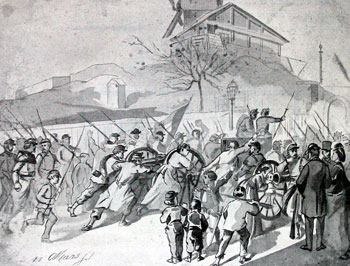In the summer of 1870, Prussia's Otto von Bismarck baited Emperor Louis Napoleon into declaring a nationalism-fueled war on Prussia. I say "baited" because Bismarck had a far more powerful army than France did, and he knew it. Prussia quickly manhandled France and took Louis Napoleon prisoner by the end of the summer. With Louis Napoleon out of power, moderate republicans in Paris declared a new French Republic and provisional government on September 4. But the problem was that the Prussians soon had Paris completely surrounded, cutting off all supplies from the city until January 28, 1871. This period was known as the Siege of Paris. The provisional government surrendered to the Prussians on January 28. This was a very unpopular move from the perspective of Paris's patriotism-crazed workers and artisans. They didn't want to give in to the Prussians. There were also a number of domestic economic measures that the government had taken against the interests of Parisians.
 |
| This is a picture of the French national army's attempt to seize cannons at Montmartre in the early morning of March 18, 1871. They were not so successful here as they were at Rue des Rosiers. Dawn had arrived while soldiers waited for horses to pull the cannons away. A crowd surrounded the army soldiers. When General Lecomte ordered them to fire on the unarmed crowd, the soldiers refused and instead turned their guns on him, taking him prisoner. Later that day, a Parisian crowd broke into the prison, pulled Lecomte out, stood against a wall and publicly executed him. Picture from: Wikipedia |
While the French army was disarmed by the Prussians according to treaty agreements, the National Guard in Paris took control of the situation in the city. The Prussian army declared a victory march on the Champs Elysees--Paris's main street for large public parades. The Paris National Guard was suspicious of Prussian intentions and acted to secure about 400 cannons that had been left behind when the French army earlier evacuated the city. The National Guardsmen took them to working class neighborhoods where they could be easily protected by both Guardsmen and the sympathetic Parisian working-class crowds. The provisional government of France took this action to be a challenge to their authority by the National Guard, mainly because after the January 28 surrender, the National Guard didn't trust the provisional government anymore. The National Guard in Paris had set up its own governing authority independent of the national government; this was called the Central Committee of the National Guard. But it wasn't just the National Guard who were upset with the provisional government for surrendering to the Prussians. The majority of Parisian civilians were as well. Many soldiers in the French army were also angry with their government--so angry that many were on the verge of siding with the rebellious Parisians and National Guard instead of the government.
On March 18, 1871, the national army was tasked with confiscating the 400 cannons from the Paris National Guard. This was essential to breaking the resistance of the Parisians to provisional government authority. Sorry for all the background information, but it all sets the scene of the early morning action of March 18. This quote describes just one instance of the army's attempt to take the cannons on that day. My explanatory brackets are inserted throughout the quote.
"Vassal's [a French army officer] men arrived just before dawn, taking the sentries by surprise. Shots were exchanged. The main body of National Guards at first mistook the police for their own men, the uniforms being similar, and shouted to Vassal to beat the generale (call to arms). Realizing their mistake, they opened fire, wounding a chasseur. A skirmish followed, 120 National Guards being surrounded in their headquarters, a house in the Rue des Rosiers, at the top of the hill, where they soon surrendered. By 5:45 a.m. the summit was firmly in the hands of the government forces. For several minutes shooting continued from the bottom of the hill, but without effect. The operation was quickly under way: the sappers began filling in the trenches surrounding the gun park [trenches had been dug by Guardsmen to prevent the easy removal of the cannons; so the army needed to fill them in to move the cannons away], and the accompanying artillery officer counted the guns and went to fetch the horses waiting in the Champs Elysees and Place de la Concorde. The gendarmes [Parisian police allied with the government] searched the house in the Rue des Rosiers, finding some interesting documents. A number of 'important leaders of the [National Guard] Federation' were arrested. [A total victory by the army, right?! Go, French army! But wait...] From the bottom of the hill, however came the disquieting report of men of the 88th drinking in a bar with National Guards." (44) --Robert Tombs, The War Against Paris 1871
While their comrades were subduing National Guardsmen on the Rue des Rosiers, some French army soldiers chose to sit down at a bar with National Guardsmen who they were supposed to be fighting against at 6 AM on March 18, a Saturday morning!
No comments:
Post a Comment